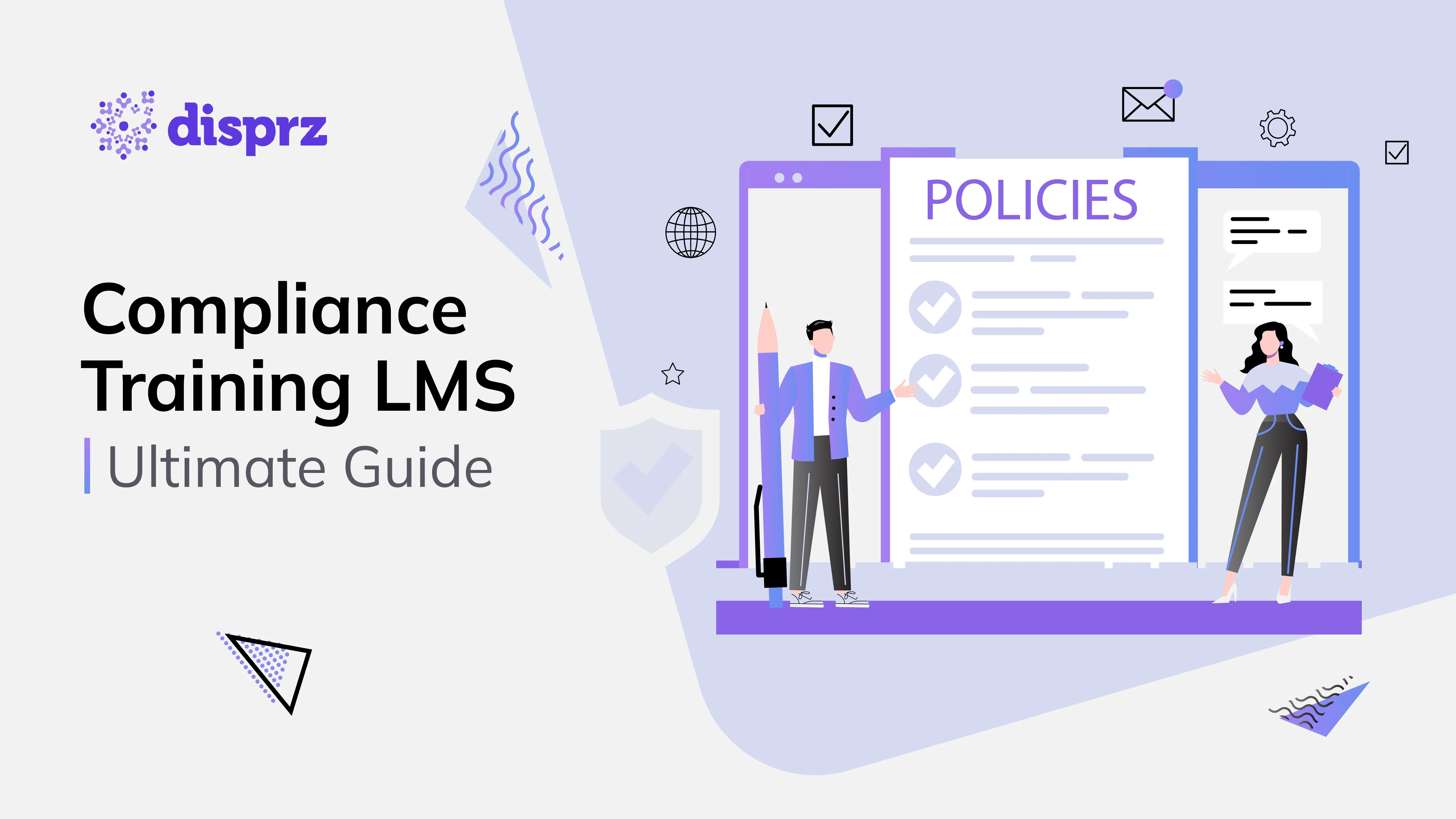What is Compliance Training?
Compliance training covers content mandated by policy, regulation, or legislation, ensuring employees are informed about company matters from health and safety to legal and cultural procedures.
Effective compliance management fosters a safe, inclusive work environment, promoting accountability and ethical behavior. It also mitigates the risk of non-compliance and enhances adherence to laws and regulations.
Types of Compliance Training
To foster a safe and inclusive company culture, you should streamline these three key compliance training programs.
Safety training
Training courses aimed at enhancing workplace safety contribute to both physical and psychological employee well-being. For instance, entities like the Occupational Safety and Health Administration (OSHA) require safety training.
Legal training
Employee training programs educate on role-related rights and responsibilities, often specific to regulatory entities like the Health Insurance Portability and Accountability Act (HIPAA) in healthcare. They cover industry standards and corporate compliance, ensuring adherence to best practices.
Cultural training
Training aimed at boosting employee awareness and recognizing organizational diversity emphasizes cultural understanding, encompassing practices, values, and expectations shaping company culture. Recognizing the significance of cultural diversity, organizations that prioritize it typically outperform less diverse counterparts financially by 36%.
Examples of Compliance Training at Workplace
There are many examples of compliance training in the workplace. Here are a few examples
Harassment
This training teaches employees to identify harassment and respond if they are victims or witnesses, ensuring a safe work environment and deterring potential perpetrators.
Safety
It focuses on company guidelines for using safety equipment and correctly performing tasks to prevent accidents.
Cybersecurity
It explains what cyberattacks are and how each employee can help prevent them on the company's computers and servers.
Ethics
This training outlines the company's values and the expected adherence by employees, detailing what constitutes ethical behavior and what does not.
Corruption and money laundering
This training covers company financial handling, appropriate and inappropriate use of funds, recognizing and reporting corruption schemes, and penalties for participating in such schemes.
Government rules
This training covers industry laws and regulations that the company must follow and emphasizes each employee's responsibility for adhering to the rules relevant to their role.
Benefits of Compliance Training Software
Acquiring compliance training learning management systems (LMS) solutions can yield numerous advantages for your financial performance.
Reduce Employee Turnover
Enhancing retention rates among top performers, effective compliance training reflects a commitment to on-the-job safety. Providing health and safety training online mitigates workplace hazards, reducing the likelihood of prolonged absences due to injuries.
Bridge Performance Gaps
Compliance training helps identify common pitfalls employees might overlook, fostering awareness and accountability in adherence to regulations. It also allows individuals to assess personal gaps relevant to their roles, promoting a proactive approach to compliance.
Improve your brand reputation
Customers prefer companies that operate transparently, and job candidates do too. Ethics and compliance training helps build credibility and enhance your brand reputation. It ensures employees understand and implement company policies, mitigating workplace risks effectively.
Lower Business Expenses
Online compliance training is cost-effective, cutting travel expenses, printed materials, instructor fees, and site rentals. It reduces training time and L&D payroll costs. Additionally, compliance training LMS solutions can lower insurance premiums and workers' comp claims.
Important Features for Best Compliance Training LMS
A modern compliance training LMS will automate tasks, boost knowledge retention, and reduce compliance risks. Ensure your LMS solution includes these essential features for effective compliance training.
Assessment functionality
Effective learning solutions offer real-time data on course progress and learner performance, allowing in-depth analysis at course, cohort, or individual levels. Tracking learner progress ensures comprehension of fundamental learning concepts.
Course content management
Look for an LMS solution with a robust course authoring tool for creating engaging courses and easily adding materials in various formats. Seek interactive features like gamification within the course builder to enhance retention.
Mobile Capability
Given the diversity of workplaces today, learners require access to compliance training content seamlessly integrated into their workflows. A mobile app can cater to specific employee categories, facilitating both online and offline mobile learning.
Automated enrollment & notifications
Streamlining your workflow, automated course enrollments, and timely reminders ensure team members stay abreast of industry standards and safety policies, freeing up valuable time.
Auto trails & certifications
Ensure compliance with automated certificate issuance and expiration notifications for employees, guaranteeing audit-ready training courses.
Compliance dashboards
Your LMS needs robust reporting capabilities to track compliance and identify compliant learners and those requiring follow-up.
Trends in Compliance Training LMS for 2025
Learning and development trends respond to workplace changes and technological innovations. Deloitte underscores individual ownership in the future learning paradigm, emphasizing personalized, integrated, and lifelong learning experiences.
Upskilling and reskilling
In 2025, organizations prioritize skills development to bridge the gap from technological advancements. Initiatives like upskilling, reskilling, and right-skilling prepare employees for changing roles and enhance competitiveness in the job market.
Generative AI
Generative AI transforms corporate training with personalized, interactive, and scalable learning experiences. It streamlines course creation, automates competency mapping, and enhances simulations for efficient upskilling and precise progress tracking. This AI-driven approach ensures higher-quality content and improved delivery methods in L&D programs, yielding substantial time and cost savings.
Microlearning
Microlearning, favored by busy corporate employees, delivers concise learning at the point of need, evolving while retaining its core concept. Influenced by platforms like TikTok, it emphasizes engaging short videos, and the Google effect highlights the importance of content labeling. Interactive elements like quizzes boost engagement and retention.
Data-driven learning
LMS solutions are evolving to analyze data, diagnose learning needs, and personalize content suggestions for each learner, enhancing engagement and retention. These platforms empower instructors to tailor learning paths, ensuring optimal outcomes and learner-centric experiences.
Extended reality (XR) in training
Anticipate more extended reality (XR) in training, incorporating immersive technologies like virtual reality (VR), augmented reality (AR), and mixed reality (MR). XR boosts engagement and interactivity, especially for complex competencies and high-risk industries, with versatile applications in technical training, onboarding, and customer service.
How to Select the Best Compliance Training LMS for Your Organization?
Vetting LMS vendors for compliance is crucial. Ensure they support their product, understand tech's role in compliance training, and stay updated on trends.
Here are the key criteria for evaluating corporate compliance training LMS solutions
Industry Know-How
Compliance training LMS vendors must understand your unique challenges, including industry risks, and how their platform can address them. They should also stay updated on tech trends and training techniques to ensure you deliver top compliance training resources.
Verifiable Social Proof
Verify a vendor's reputation through ratings, reviews, and their social media presence. It's essential to observe not only their activity but also how they engage with followers.
Transparent Pricing
Price isn't everything, but you need an LMS that fits your budget and delivers the best return on investment (ROI) without hidden fees. The vendor should be transparent about costs and available pricing plans, such as a monthly subscription for a specific number of users.
The Role of AI in Compliance Training
Compliance training hasn’t exactly earned rave reviews across industries. It’s often reduced to a box-ticking exercise; generic, one-size-fits-none, and more about covering liabilities than building real capability. But AI in compliance training is changing that fast.
AI is bringing real intelligence to compliance. Instead of blasting the same modules to everyone, AI helps personalize learning based on an employee’s role, location, risk exposure, and even behavioral data. Your sales team gets what’s relevant to them. Your finance team sees what matters to them. And your high-risk geographies? They get laser-focused nudges and reinforcement.
But the real power lies in AI’s ability to help you see around corners. With predictive analytics, organizations can identify knowledge gaps, disengagement patterns, and compliance blind spots before they transition into costly incidents. No more waiting for annual reviews or audit season. AI enables always-on visibility and action.
And let’s not forget the learner experience. AI makes compliance less robotic and more relatable, with autogenerated scenarios, plain-language policy explainers, and contextual microlearning that actually sticks. It transforms training from something people have to do into something they understand and apply.
This is exactly where Disprz comes in. As a GenAI-powered learning platform, Disprz doesn’t just deliver compliance content, it intelligently orchestrates it across roles, geographies, and business priorities. The result? Compliance that’s not just easier to manage, but far more meaningful.
Conclusion
Disprz platform is an exemplary solution for modern compliance training, offering robust features that ensure efficient and effective learning experiences. With capabilities such as automated enrollments, mobile accessibility, and data-driven insights, Disprz addresses the diverse needs of organizations, ensuring compliance and enhancing workforce performance. The platform's emphasis on personalized learning paths and real-time tracking further solidifies its role in fostering a culture of continuous improvement and safety in the workplace.








